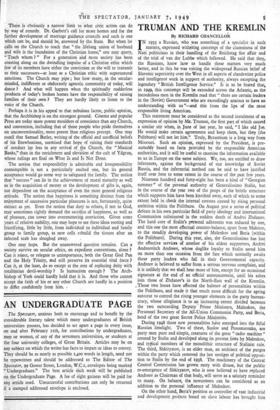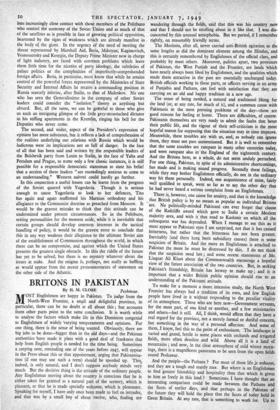TRUMAN AND THE KREMLIN
By RICHARD CHANCELLOR
IN 1933 a Russian, who was something of a specialist in such matters, expressed withering contempt of the clumsiness of the Nazi politicians in their handling of the Reichstag fire affair and of the trial of van der Lubbe which followed. He said that they, the Russians, knew how to handle these matters very much better, and in this he was voicing the widespread Russian belief of Slavonic superiority over the West in all aspects of clandestine police and intelligence work in support of authority, always excepting the legendary " British Intelligence Service." It is to be feared that, in 1949, this contempt will be extended across the Atlantic, as the incredulous men in the Kremlin read that " there are certain leaders in the (Soviet) Government who are exceedingly anxious to have an understanding with us "—and this from the lips of the most responsible living American.
This statement must be considered as the second instalment of an expression of opinion by Mr. Truman, the first part of which caused a similar stir when, in June of last year, he said, " I like old Joe. He would make certain agreements and keep them, but they (the Politburo) will not let him." Truly, Byzantium is a long way from Missouri. Such an opinion, expressed by the President, is pre- sumably based on facts provided by the responsible American authorities, and it will be useful to examine the information available to us in Europe on the same subject. We, too, are entitled to draw inferences, against the background of our knowledge of Soviet Russia, and the inferential method can be said to have justified itself over here to some extent in the course of the past few years.
Nineteen hundred and forty-eight has been a kind of "Georgian summer" of the personal authority of Generalissimo Stalin, but in the course of the year two of the props of the brittle structure which supports him have been knocked away, each of which to some extent held in check the internal stresses caused by rising personal ambition within the Politburo. On August 31st a series of political defeats in his own particular field of party ideology and international Communism culminated in the sudden death of Andrei Zhdanov. The hard core of Stalin's personal adherents was reduced by one, and this one the most effectual counter-balance, apart from Molotov, to the steadily developing power of Malenkov and Beria (within the Politburo). During this year, also, the Generalissimo has lost the effective services of another of his oldest supporters, Andrei Andreevitch Andreev, whose doglike loyalty to Stalin saved him on more than one occasion from the fate which normally awaits those party leaders who fail in their Governmental capacity. Andreev is believed to suffer from a serious nervous complaint, and it is unlikely that we shall hear more of him, except for an occasional signature at the end of an official announcement, until his ashes join those of Zhdanov's in the North-East wall of the Kremlin. Those two losses have affected the balance of personalities within the Politburo, and made it that much more difficult for the ageing autocrat to control the rising younger elements in the party bureau- cracy, whose allegiance is to an increasing extent divided between the two outstanding Deputy Prime Ministers, Malenkov, the Personnel Secretary of the All-Union Communist Party, and Beria, head of the two great Secret Police Ministries.
During 1948 three new personalities hive emerged into the fitful Russian limelight. Two of these, Suslov and Ponomarenko, are party men pure and simple, creatures of the great " cadre machine " created by Stalin and developed along its present lines by Malenkov, and typical members of the monolithic structure of Stalinist rule. The third, Shkiryatov, is an older man, an architect of the purges within the party which removed the last vestiges of political opposi- tion to Stalin by the end of 1938. The machinery of the Central Control Commission has grown rusty with disuse, but the public re-emergence of Shkiryatov, who is now believed to have replaced Andreev as Chairman of that body, will serve as a salutary reminder to many. On balance, the newcomers can be considered as an addition to the personal influence of Malenkov.
On the other hand, Beria's position as controller of vast industrial and development projects based on slave labour has brought him
into increasingly close contact with those members of the Politburo who control the economy of the Soviet Union and as much of that of the satellites as is possible in face of growing political opposition, heartened by the signs of weakness which are already manifest in the body of the giant. In the urgency of the need of meeting the threat represented by Marshall Aid, Beria, Mikoyan; Kaganovitch, Vosnessensky and Kosygin, the Deputy Prime Minister now in charge of light industry, are faced with common problems which leave them little time for the niceties of party ideology, the subtleties of palace politics or the complexities of imperfectly-comprehended foreign affairs. Beria, in particular, must know that while he retains control of the powerful forces represented by the Ministries of State Security and Internal Affairs he retains a commanding position in Russia scarcely inferior, after Stalin, to that of Malenkov. No one who has seen the Generalissimo in the company of other Soviet leaders could consider the " isolation" theory as anything but absurd. But, all the same, we can be grateful to those who give us such an intriguing glimpse of the little grey-moustached dictator in his stifling apartments in the Kremlin, ringing his bell for the Deputies who never come.
The second, and wider, aspect of the President's 'expression of opinion has more substance, but it reflects a lack of comprehension of the realities underlying our relations with Russia which would be ludicrous were its implications not so full of danger. In the face of all that has been said and written by the responsible leaders of the Bolshevik party from Lenin to Stalin, in the face of Yalta and Potsdam and Prague, to name only a few classic instances, it is still possible for a responsible democratic statesman to state his belief that a section of these leaders " are exceedingly anxious to come to an understanding." Western naiveté could hardly go further.
In this connection a useful lesson can be learnt from the progress of the Soviet quarrel with Yugoslavia. Though it is serious enough to cause Yugoslavia to look to her defences, Tito has again and again reaffirmed his Marxian- orthodoxy and his allegiance to the Communist doctrine as preached from Moscow. It would be the gravest mistake to think that this attitude can be undermined under present circumstances. So in the Politburo, setting personalities for the moment aside, while-it is inevitable that certain groups should develop common interests in the tactical handling of policy, it would be the gravest error to conclude that this in any way weakens their allegiance to the ultimate Soviet aim of the establishment of Communism throughout the world, in which there can be no compromise, and against which the United States presents the greatest single obstacle. In this the riddle of the future has yet to be solved, but there is no mystery whatever about the issues at stake. And the enigma is, perhaps, not really as baffling as would appear from the recent pronouncements of statesmen on the other side of the Atlantic.







































 Previous page
Previous page